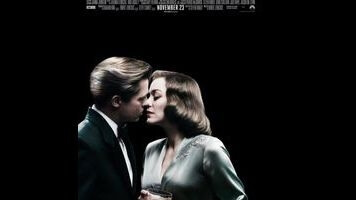Robert Zemeckis has rocketed Michael J. Fox into a picturesque 1950s, spliced Tom Hanks into old footage of dead presidents, and dropped Joseph Gordon-Levitt onto a cable suspended between the still-standing Twin Towers. Sending movie stars back in time is one of the director’s specialties, it would seem. But Allied, his new World War II drama, doesn’t just meticulously rebuild battle-ravaged cities of the 1940s around Brad Pitt and Marion Cotillard. It also inserts these A-listers into a time-warp anachronism of a movie—the kind of lavish, glamorous thriller for grownups the two might have appeared in during the actual ’40s, had they been born half a century earlier. Zemeckis has fashioned an unfashionable throwback, and if Allied doesn’t land the gut-punch it winds up to deliver, there’s nevertheless plenty to admire in a blockbuster craftsman and two beautiful stars paying tribute to the spirit of an older Hollywood.
Reenlisting in the Nazi-killing campaign he joined with Inglourious Basterds and Fury, Pitt plays dapper Canadian airman Max Vatan, who parachutes into the French Morocco of 1942 on special assignment from the British military. He’s come to rendezvous with undercover French Resistance fighter Marianne Beausejour (Cotillard) in Casablanca, where the two will pose as married Nazi sympathizers, while plotting to assassinate the German ambassador. “I keep the emotions real,” Marianne tells Max. “That’s why it works.” And as the two playact as husband and wife, hobnobbing in public and kissing on the roof of her flat for the benefit of nosy neighbors, the emotions do seem to become real. They’re enhanced, certainly, by the life and death stakes of the pair’s big operation: a private soiree with a view to a kill. Also, the two look like Brad Pitt and Marion Cotillard. Things were bound to get steamy.
This extended opening act is basically its own movie, a protracted behind-enemy-lines romance between two soldiers whose imitation of love shades into the genuine article. Or does it? Screenwriter Steven Knight, who (relevantly) traced the secret allegiances of David Cronenberg’s Eastern Promises, unveils the actual arc of the story once Allied leaps ahead in time, shifting from the arid deserts of North Africa to the bombed-out streets of London. It’s there that Max—close to settled down, though the war rages on—is informed by his superiors in British intelligence that Marianne, now his wife and the mother of his child, may not be who she claims to be. And if the intel they have on her proves accurate, he’s obligated to deal with this “intimate betrayal“ (as the military officially labels it) himself. Is the whole thing a test? Or is Marianne still playing a part, keeping the emotions real to perform her secret duty?
It’s a conflict of loyalties and suspicion worthy of Hitchcock. For Zemeckis, it provides an opportunity to reinvent himself as an old-school master of suspense. Allied administers little tests of knowledge and identity, the questions its characters use to probe at each other’s surfaces. One scene, a doozy involving a pack of cards and a wary Nazi officer, hinges on the chemical symbol for phosphate. Another pivots around the hobbies and eye color of a woman in a photograph. Zemeckis trots out the old tricks of generating tension—an engine that won’t start; a play on the stock scene of a bank robbery staged entirely from the nervous perspective of the getaway driver—and makes them hum again. The director even includes a variation on Hitchcock’s fabled, figurative bomb under the table, adding an actual ticking clock to boot.
Allied, with its vintage vehicles and extravagant chandeliers and fetching 1940s fashions, is transparent about its aspirations to studio classicism. But this isn’t some fetishistic museum exhibit, à la Steven Soderbergh’s The Good German; the technique is thoroughly modern. Zemeckis, shooting on digital, can’t resist splashing his immaculately constructed period settings—including a Casablanca more or less constructed from scratch—with some of his usual state-of-the-art spectacle, including a scene of Marianne giving birth during an explosive nighttime air raid on the hospital. (Less constructively, an early sex scene takes place during a sand storm, surrounding the couple’s automotive love nest with a distracting blur of CGI sand.) There’s also the fact that Zemeckis has no Production Code restricting his vision. The violence comes hard and fast, the characters fuck and say ”fuck,” and Max’s openly gay sister (Lizzy Caplan) canoodles with her lover at a swanky London bacchanal.
None of this prevents Allied from operating like a blast from the past, like the sort of movie people insist never gets made anymore. What it lacks, quite crucially, is a genuine flush of feeling—the very element that might have placed the film in the same league as the classics it emulates. (It may begin in Casablanca and end on a tarmac, but the ghost of Michael Curtiz can rest easy.) The big problem may be Pitt, who’s only interesting as an actor when playing characters with a spark of eccentricity or a touch of madness. Here, he neither burns with affection for Marianne nor simmers with distrust and anxiety once doubt is cast over her intentions. It’s a flatly functional star performance, especially when held against Cotillard’s more complex work as a woman losing herself in masquerade, and that diminishes the impact of the film’s personal drama—even as Zemeckis compensates with spectacular visual touches like Max studying Marianne through the reflections of multiple bathroom mirrors, wondering which version of her is the real one. To paraphrase its question mark of a heroine, Allied doesn’t make the emotions real. That’s why the film “works,” but doesn‘t transcend.


















![HBO teases new Euphoria, Larry David, and much more in 2026 sizzle reel [Updated]](https://img.pastemagazine.com/wp-content/avuploads/2025/12/12100344/MixCollage-12-Dec-2025-09-56-AM-9137.jpg)






















